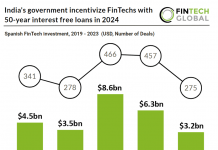As we stand on the brink of 2024, experts from Fenergo, a leading FinTech firm, forecast a pivotal year in the realm of financial regulation.
The trajectory of enforcement actions is on a steep incline, with global penalties surging to $6.6bn, marking a 57% increase from the previous year. This uptick signifies a proactive stance from regulators, underlining the urgency for financial institutions (FIs) to adapt and comply with the evolving regulatory landscape.
The digital assets sector, particularly the crypto firms, found themselves under intensified scrutiny in 2023. The punitive fines levied against crypto firms ballooned from a considerable $193m in 2022 to an astronomical $4.5bn in 2023. Stella Clarke, Chief Strategy and Marketing Officer at Fenergo, anticipates that 2024 will perpetuate this trend. Regulatory bodies are expected to rigorously monitor reporting lapses, aiming to mitigate financial malpractices and safeguard investor interests.
In the United States, the regulatory roadmap for cryptocurrencies is undergoing delineation, with Congress debating the custodian of consumer protection within the crypto sphere. As these discussions progress towards clarity, the crypto trade volume within the US is projected to escalate, reflecting a responsive market sentiment.
The year 2024 is poised to be pivotal, marked as the ‘year of regulatory revolution’ by Tracy Moore, Director of Thought Leadership at Fenergo. FIs are bracing for heightened regulatory demands and more stringent compliance requirements. The focus is particularly intense on beneficial ownership information (BOI), with regulatory entities like the Commodities and Futures Trading Commission (CFTC) and FinCEN finalizing directives and advisory guidelines. This shift signifies a substantial move towards transparency and accountability within the financial sector.
Europe is not far behind in the regulatory marathon, with substantial reforms on the horizon. The impending EU’s single rulebook and the recalibrated thresholds for ultimate beneficial ownership checks present formidable challenges for FIs. Rory Doyle, Head of Financial Crime Policy at Fenergo, highlights the drastic reduction in the beneficial owner threshold, necessitating extensive remediation initiatives by European FIs to comply with the stringent regulations.
The narrative of digital transformation continues to unfold, with the spotlight gradually shifting towards smaller FIs. The integration of Artificial Intelligence (AI) into this transformation is a topic of keen interest. The industry is abuzz with the potential of AI to revolutionize compliance, yet its definitive impact remains a subject of anticipation. Cengiz Kiamil, VP of Market Development at Fenergo, underscores the upcoming year as a critical phase to evaluate the tangible returns on the investments poured into AI capabilities.
Amidst these advancements, FIs must also brace for the persisting geopolitical volatility and the intensifying sanctions regime. Stella Clarke emphasises the escalating screening obligations, driven by geopolitical uncertainties and the consequent surge in sanctions activities. These challenges are anticipated to amplify in 2024, necessitating robust preparedness from compliance departments across the financial services spectrum.
In the face of these impending regulatory upheavals, 2024 heralds a year of significant transformations. The journey is complex, but with strategic foresight and the right partnerships, FIs can navigate this evolving landscape, ensuring compliance and resilience in the dynamic world of finance.
Read the full post here.
To read the latest breaking RegTech stories as they happen visit https://member.regtechanalyst.com/
Keep up with all the latest FinTech news here.
Copyright © 2024 FinTech Global











